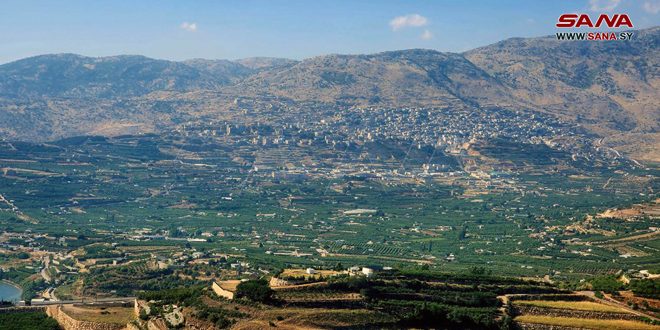Farmers in occupied Syrian Golan suffer from increasing losses due to the occupation’s aggression on Gaza and restrictive measures
Currently, it is the cherry picking season in the occupied Syrian Golan and farmers in this region are facing increasing difficulties due to the Israeli occupation’s restrictions, including imposing high costs for irrigating their lands, impeding the marketing of the crops outside the Golan and depriving the farmers of their source of livelihood in an attempt to undermine their steadfastness and clinging to their land.
Through these arbitrary measures against the people in the Syrian Golan, the occupation aims to displace them as to continue carrying out its settlement building project that includes building huge wind turbines on the Golanese farmlands, under the pretext of generating electricity from wind energy, while its real goal is to confiscate these lands.
Cultivating apples and cherries is a symbol of the steadfastness of the people in the occupied Golan, particularly in the light of the high costs of agriculture, which have now exceeded the value of their production, especially cherries.
However, despite their suffering, the people in Golan confirm that the occupation’s practices will increase their adherence to every inch of their land and to their crops, mainly apples and cherries, which are distinguished by their quality, sweet taste and above all the flavor of steadfastness and sacrifice.
Farmer Fares Oweidat explained to a SANA reporter that cherry plants are spread over an estimated area of 5,000 dunums in the villages of the occupied Syrian Golan, and that this year was the most difficult for Golan farmers, as the Israeli aggression on Gaza Strip prevented thousands of Palestinians from the West Bank and the occupied territories of 1948 to go to the Syrian Golan to buy cherry, as they did every year, because the occupation has maintained its closure of the Quneitra crossing for about 10 years.
The cherry orchards in the occupied Golan are facing the danger of confiscating 4,000 dunums of them by the Israeli occupation which plans to build wind turbines, one of the most dangerous Judaizing colonial plans targeting the occupied Syrian Golan.
Since August 27, 2014, the occupation has continued to close the Quneitra crossing, which is the only artery for the people of the Golan to communicate with their homeland, Syria, and to visit their families, after the occupation separated them since 1967. The occupation also prevents the importation of cherries and apples to the homeland’s markets, despite Syria’s continued demands from the international community to pressure the Israeli occupation to open and operate the crossing.
Hamda Mustafa

